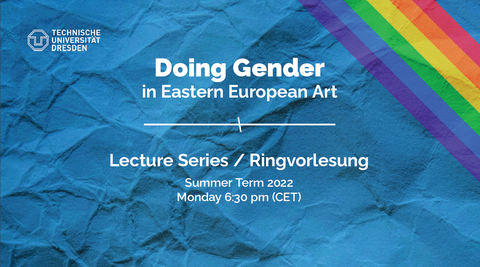Apr 25, 2022
Lecture Series - Doing Gender in Eastern European Art (Summer term 2022)
A series of online lectures will take place from April 25 until July 11, 2022!
In Eastern Europe of the 2010s and early 2020s, the notion of gender became the focus of social debates and political actions. Art performances, interactive exhibitions, pedagogical projects, poetry interventions and other multimedia projects has been and are not only an essential part of the intellectual boom of feminist (sub)cultures and queer communities today. They are also a major crossroad and a mirror of other current discussions: on social inequality, political repressions, ecology or the suppression of collective memory. At the same time, the topic of gender provides an important impetus for the formation of communities with shared identities that run counter to the ideological mainstream and the politics of populism and propaganda.
In this lecture series, academics, activists and artists from different countries and various research fields will analyze peculiarities of aesthetic gender landscapes in Russia, Belarus, Ukraine and Poland. The focus will be on the recent and most recent periods (2010-2020s), when in a number of regions of Eastern Europe conservative and sometimes even patriarchal-sexist laws has been adopted, which discriminated sexual minorities and legalized domestic violence.
We will be interested in the following questions: What is the most topical agenda of artistic gender practices today? What is post-feminism, ecofeminism or digital queer? How does gender relate to other social and political issues in Eastern Europe? What does the culture of art participation look like today from a gender perspective (for example, within the framework of the so-called aesthetics of motherhood and care)? How are these practices mediatized and what public spaces do they engender?
Participation
The lectures will be held online every Monday of Summer Term 2022 on Zoom. No registration is required to attend on our meetings. Interested public and listeners are welcome to participate!
|
Next lecture on July 11, 2022 at 6:30 PM (CET) *CANCELLED* Zoom-Link: Meeting-ID: 842 6285 0737 - - - - - - - - - - - - - - - - - - - - - - - - - - - - - - - - - - - - - - - - - - - - - - - - - - - - - - - - - - - - - - - - - - - The Political Imagination of the Anti-War Resistance The topic of this lecture is the theory of civil resistance discussed on the basis of two books: “Cyborg Nationalism. Ukrainian nationalism in the era of post-nationalism” by the Ukrainian philosopher Irina Zherebkina (co-authored with Sergey Zherebkin) and “Community after the Holocaust” by the Belarusian philosopher Olga Shparaga (about the ethical-political project after the catastrophe of the Second World War and its civil project of the future). The current political and military catastrophe can be explained with the help of the theoretical debates and the split in philosophy of the last 30 years. On the one hand, the post-structuralist deconstruction of ideologies caused the effect of individual and multicultural liberation followed by the freedom of imagination with its orientation towards affects and myth-making (used not only by civil communities or artists, but also by dictators). On the other hand, it resulted in politics of care and social and cultural responsibility. The politics of dignity, equality of cultural experience, care and the material significance of bodies became new challenge during the war. It should be analyzed, how the gender difference in approaches to materiality and value is reproduced in this diversity, and why the project of the future falls into the blind spot of traditional approaches. Alla Mitrofanova is an independent researcher and art critic, she was participant of numerous electronic art conferences of the early 1990s (ISEA, Next5min, DEAF, etc.), co-curator of the Stubnitz-electronic art project (St. Petersburg, 1994), co-founder of the Cyberfemin Club (St. Petersburg, 1994), and member of the Cyberfeminist International (Kassel, Documenta X, 1997). Currently, she studies and teaches contemporary philosophy, drawing on the experience of cultural diversity and technological bias of the new generation with its key concepts of contingency, technology, and corporality. She also teaches feminist theory: feminist epistemology, theory of culture and art. She has published numerous articles, and is currently working on a book on feminist philosophy. - - - - - - - - - - - - - - - - - - - - - - - - - - - - - - - - - - - - - - - - - - - - - - - - - - - - - - - - - - - - - - - - - - - |
More information about our lecture series you can find on our website.

